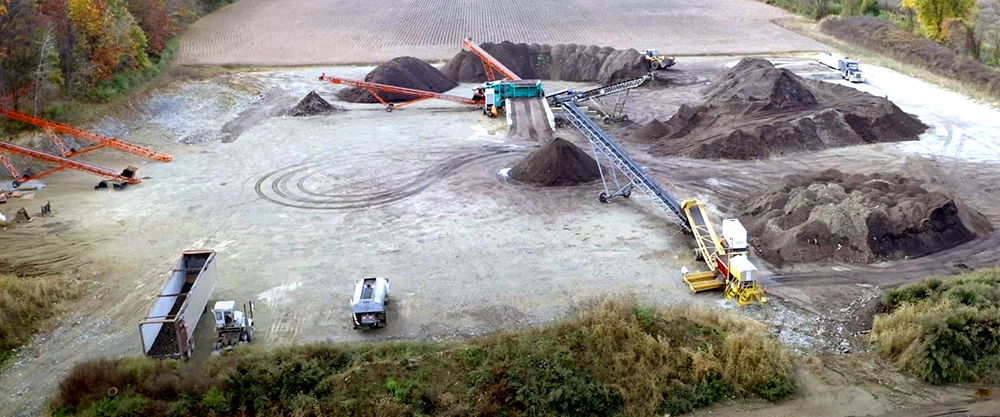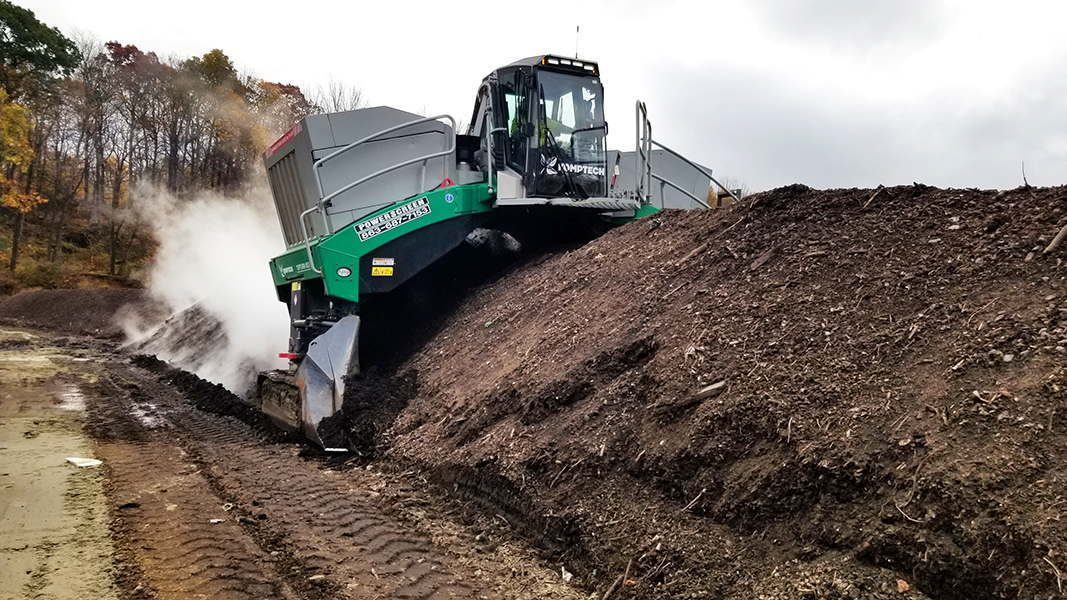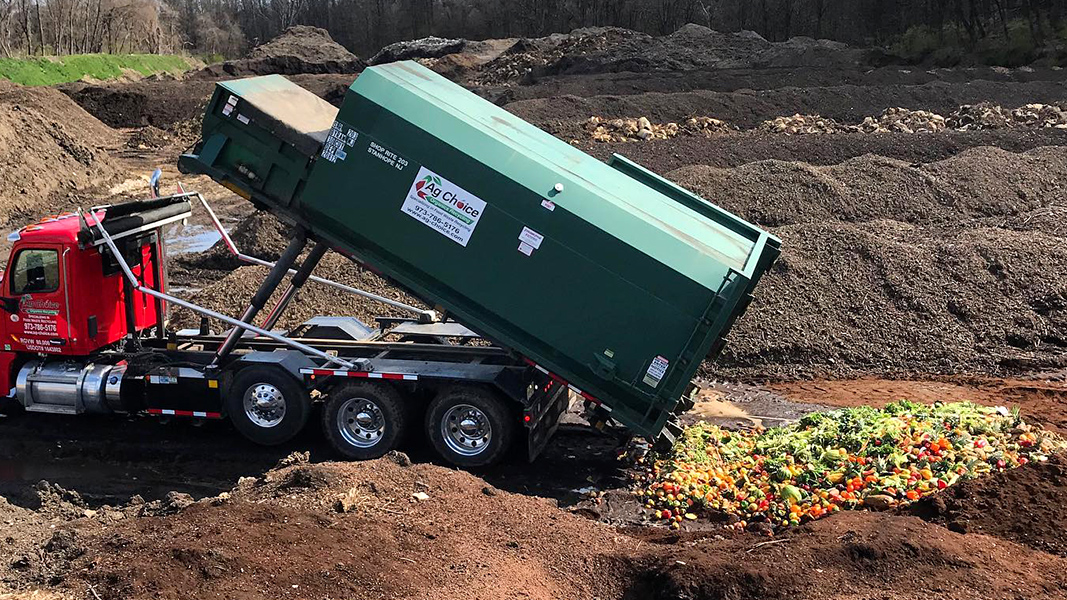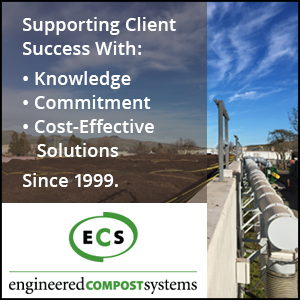Nora Goldstein
Ag Choice in Andover, New Jersey, is the state’s only commercial-scale composting facility that accepts source separated food waste streams. Founded in 2005 by Jay and Jill Fischer, Ag Choice recently added 4 acres to its existing 8-acre site. The expanded area is used exclusively for compost screening, blending and loading trucks with outbound products.
BioCycle first visited Ag Choice in 2007, two years after the Fischers started their organics collection and composting enterprise as an offshoot of Jay’s family sawmill, which sold sawdust to small horse farms in the area, and backhauled manure and bedding to compost. At the time, Ag Choice also was collecting preconsumer organics from several area grocery stores.
Throughout its 16-year existence, Ag Choice has always operated under a New Jersey Department of Environmental Protection (NJDEP) Research, Development and Demonstration (RD&D) assignment. This is in place of Ag Choice having a much more costly Class C solid waste permit, which requires that food waste composting be done in an enclosed building on a concrete floor. The first RD&D assignment was issued to Ag Choice to show it could compost food scraps, manure and yard trimmings in outdoor windrows on a compacted soil pad. The facility was limited to processing only preconsumer food waste, and a total of 10,000 cubic yards (cy)/year of organic materials.

A 4-acre compost screening and blending area, adjacent to Ag Choice’s composting operations, was added in 2020.
The company moved from its original location to the 8-acre farm site in Andover in 2014. By that point, the research showed that composting food scraps could be done outdoors in windrows without causing public health or environmental nuisances. When BioCycle visited the new facility in 2016, Ag Choice was still under an RD&D assignment but allowed to take in 38,000 cy/year of materials, including pre and postconsumer food scraps and all proteins such as meats, dairy and seafood. The composting site has a compacted gravel pad. “Our first RD&D project showed that food waste composting doesn’t need to be on an impervious pad, and that compacted gravel is acceptable,” notes Fischer.

The open-air windrow composting facility, equipped with a Komptech Topturn turner, is permitted to process 38,000 cubic yards/year of material. Photos courtesy of Ag Choice
Fast forward to January 2021, when we reached out to the Fischers for an update. They have filed for their third RD&D assignment, this time to conduct research on animal mortality composting in open-air windrows. “We will be processing deer, bear culls, and butcher waste — anything they can’t process or send to a renderer,” notes Jay Fischer. “We also recently procured a nearly new Komptech turner with only 650 hours on it, which replaces our smaller Komptech Topturn unit. Ag Choice has 20 employees, including a full-time site scientist who does all of our process monitoring as well as compost sampling, recordkeeping for NJDEP compliance and more.” A Reotemp oxygen and temperature reading probe is used for monitoring the piles. The site also has a Komptech Star Screen, along with two Hurrikan air classifiers to remove plastic from finished compost.
“We have our own fleet for organics collection as well as end product deliveries,” adds Fischer. “Local municipalities bring in yard trimmings. In terms of food waste streams, we still work primarily with grocery stores, distribution centers, food manufacturers and industrial processors. Several local companies that do small-scale residential food scraps collection bring that material here. We do not accept restaurant waste because of the potential for contamination.”
Angling Toward Tiered Composting Regulations
Ag Choice, the New Jersey Composting Council (NJCC) and other stakeholders have been meeting with NJDEP to create a tiered approach to regulating composting facilities that accept food waste — especially since a law that bans food waste disposal for certain size generators was passed in 2020. The current Class C solid waste recycling permit doesn’t allow for various scales of food waste composting operations, which include community composting sites and community gardens that process small amounts of food waste. “The one-size-fits-all Class C permit is antiquated and not based on science,” explains Fischer, citing the data that Ag Choice has provided to NJDEP over the years. “And the cost to apply for and maintain the permit is prohibitive — a $50,000 permitting fee, which doesn’t take into account costs for engineering, storm water management, and air quality compliance. The annual compliance fees are over $30,000/year. That is out of reach for most organics recycling operations in the state.”
He emphasizes that more recent meetings with NJDEP staff have been positive, and progress is being made on rule revisions. “The Department has been responsive to our suggestions,” he says. “We anticipate NJDEP will create exemptions to the existing rule, especially for community-scale composting. Changing the rules requires a legislative process, so we don’t expect to see new rules adopted for at least one to two years. But I’m hopeful that — more than 15 years in — the modifications will become reality. Ag Choice has composted millions and millions of pounds of food waste, 365 days a year, in outdoor windrows. This works well.”
Coffee Capsule Recycling

Ag Choice recycles Nespresso aluminum capsules on a processing line that features cross belt magnets, an eddy current separator and a Scott Equipment Turbo Separator. Coffee grounds are composted and the aluminum is recycled.
In October 2011, the Fischers received a call from a consultant to Nestlé Nespresso U.S.A. “The consultant asked if we were familiar with Nespresso, and I said, ‘yeah, sure’,” explains Fischer. “Nespresso was looking for a facility to recycle its used coffee capsules, which is part of its commitment to creating shared value. As soon as I hung up, I went on the Internet and learned that the capsules were aluminum, and contained coffee grounds. Jill and I discussed this opportunity and decided to say yes. I am the quintessential entrepreneur and knew I could find a way to make it work.”
Nespresso offers pre-paid recycling bags free of charge for its customers in 48 states to mail back used aluminum Nespresso capsules to be recycled. Those customers can bring their bag filled with used capsules to any UPS drop-off location, Nespresso boutique, or select retail partner. Once capsules are collected, they are sent to Ag Choice for depackaging in a Scott Equipment Turbo Separator, which separates the aluminum from the coffee grounds. The Fischer’s leased a 15,000 square foot warehouse in a nearby town to house the processing line. The coffee grounds are turned into nutrient-rich compost and topsoil and the aluminum is processed and sent back to the value chain to be reused to produce new products.
Our 2016 article about Ag Choice’s expansion into coffee capsule recycling described how thousands of pounds of capsules were being shipped each day from consumers or collected loose at Nespresso boutiques and transported in bins. At the time, Ag Choice also was using the Turbo Separator to process packaged off spec food waste like cereals, candy, pasta and rice, which would be sold for animal feed. “Things have definitely evolved since your visit five years ago,” notes Fischer. “Probably the most significant is that Nespresso’s patent on the coffee capsules expired, so other companies are allowed to manufacture ‘Nespresso friendly’ capsules that use plastic packaging instead of aluminum. This required a different preprocessing line ahead of the depackager.”
Ag Choice had already added cross belt magnets on its line to remove items such as batteries and bottle caps that it finds in the bags along with the capsules. “We even had one bag that contained an entire kitchen faucet,” he adds. The plastic capsules have to be removed so that they don’t contaminate the bales of aluminum that Ag Choice recycles. An eddy current separator was installed at the end of a conveyor belt line to prevent the plastic capsules from reaching the depackager.
“Essentially, the eddy current separator has a roller drum that houses a rotor that spins at 3,000 RPMs (rotations/minute) inside the drum,” explains Fischer. “That creates a field that repels the aluminum capsules, which jump the gap at the end of the conveyor line and land on the conveyor running to the Turbo Separator. The ‘imposter’ capsules fall off the belt. This enables us to separate out the high volume of the imposters.” The increased volume of capsules led Ag Choice to stop processing packaged food for animal feed at this time.














